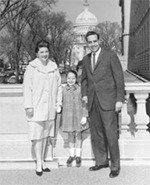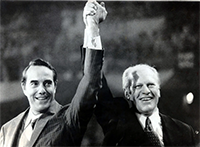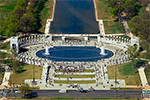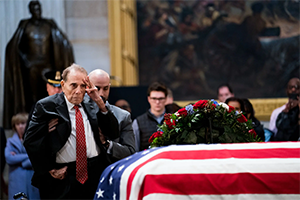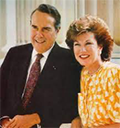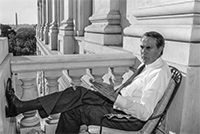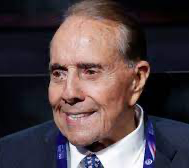|
GOP Stalwart, Standard-bearer Bob Dole Dead at 98
December 5, 2021
Bob Dole, the Kansas war veteran and longtime politician known for his long career in public life and his acerbic and sometimes caustic wit, has died. He was 98. He died in his sleep, his family said, after a battle with lung cancer. He had increasingly battled illness and ailments in his later years. He was born in Russell, a western Kansas town, on July 22, 1923. His father was Doran Dole, and his mother was Bina Dole. She worked as a seamstress and a sewing machine saleswoman, he in a creamery and as the manager of a grain elevator. Robert, the second of his parents' four children, was a skilled athlete, lettering in basketball, football, and track. An adept student, he had plans to study medicine. But he served in World War II and suffered a crippling injury that changed his life plan. Having joined the Army Reserve during his college days studying medicine at the University of Kansas, he found himself called up to active duty in 1943, when he was 19. He was a second lieutenant in the 10th Mountain Division. He served in the European Theatre and, on April 14, 1945, was defending the Italian town of Castel D'Aiano, in the Apennine mountains southwest of Bologna, when, in helping Dole endured more than three years of recovery, with multiple bouts of surgery and a rigorous recovery that featured a homemade weight-and-pulley system to help him recover his strength. It worked, to an extent, but he spent the rest of his life not using the right side of his body much. Unable to shake hands, he took to holding a pen in his right hand in order to discourage other people from trying to shake that hand. It was during his recovery that he met Phyllis Holden, an occupational therapist. The two fell in love and married, in 1948. He went back to college, courtesy of the G.I. Bill, changing his venue of study to Topeka and what is now Washburn University but was then Washburn Municipal. He finished with a bachelor's degree and a law degree, both in 1952. Two years later came Bob and Phyliss's daughter, Robin. Dole parlayed his law studies into a job as a lawyer in Russell County and then won his first election in 1960, to serve Kansas in the U.S. House of Representatives. Eight years later, after representing both the 6th District and then the 1st District, he won election to the U.S. Senate. He served in that body for the next 28 years. Then-President Richard Nixon named Dole national chairman of the Republican Party in 1971. He served in that capacity for only a year, but that prominence put him in prime position to be chosen as the vice-presidential candidate of President Gerald Ford, who had assumed the presidency after Nixon resigned and was running in his own right in 1976. Jimmy Carter, then Governor of Georgia, won that election, and Dole returned to the Senate. He was most at home in the upper house of Congress, in which he served a long time as chairman of the powerful Finance Committee. He was Majority Leader or Minority Leader for 11 straight years, ending in 1996, when he left the Senate to run for President yet again. (He had also run in 1980 and 1988 but had lost the nomination to Ronald Reagan and George Bush, both of whom won their respective general elections.) In 1996, Dole finally won his party's nomination but lost heavily to the incumbent, President Bill Clinton. Dole then retired from politics and went to work as a lobbyist for Alston & Bird, an international law firm. He appeared in several well-known television commercials (including for Pepsi-Cola and Visa) and appeared as himself on the TV comedy show Saturday Night Live. By the time that he retired, he had voted more than 12,000 times. Although a conservative at heart and early in his career a staunch partisan, he was not averse to supporting and voting for policies and bills not always supported by those who shared his political views. Among his many achievements were rescuing the Social Security system in 1983 and championing the Americans With Disabilities Act in 1990; both were bipartisan efforts (the first forged with Democratic Sen. Daniel Patrick Moynihan and the second crafted with Sen. Edward Kennedy). As well, he and former Democratic Sen. George McGovern in 2002 created the International Food for Education and Child Nutrition Program, which still sends nutritious meals to children in developing countries all over the world. Working with his former political opponent, he and Clinton helped set up the Families of Freedom Foundation, to help pay for the college educations of the families of victims of the September 11, 2001, terrorist attacks on New York and Washington, D.C. Dole once said, "The difference between possible and impossible is hard work and commitment." He eventually retired from public life but continued to make a difference, helping raise nearly $200 million toward the construction of a National Mall memorial to honor World War II veterans. The memorial, opened in 2004, is in between the Lincoln Memorial and the Washington Monument. In 2014, Dole embarked on a reunion tour of his home state. He visited all 105 counties in Kansas, reconnecting with old friends. One of this last public appearances was at the Capitol Rotunda, in which he stood from a wheelchair and saluted the flag-draped coffin of former President George Bush, lying in state after his death in 2018. He had done the same thing in the same setting six years earlier, to honor his lifelong friend Daniel Inouye, a Democrat who represented Hawaii in the Senate for many years. The two, both of whom had lost an arm in battle during World War II, forged a friendship recuperating at the same Army hospital. Dole and Phyllis had divorced in 1972. In 1975, he married Elizabeth Hanford, who went on to become a powerful politician of her own, serving as Secretary of Transportation and later Secretary of Labor, in the U.S. Senate representing North Carolina, and running for President herself in 2000. She later served as President of the American Red Cross. Phyllis remarried. She died in 2008. Elizabeth and Robin Dole survive. Among the many accolades for Dole was his Senate colleagues' naming of the porch of the Republican leader's office the Robert J. Dole Balcony. Dole spent many hours there making political deals. He also received the Presidential Medal of Freedom, the Presidential Citizens Medal, the Congressional Gold Medal, and the American Patriot Award. He is the namesake of the the Institute of Politics at the University of Kansas. Dole also wrote a handful of books, including his autobiography, One Soldier's Story: A Memoir (2005). He had written a similar book a few years earlier: Great Political Wit: Laughing (Almost) All the Way to the White House (1998). He also wrote a collection of humorous quotes and stories about American Presidents titled Great Presidential Wit (2001). Some of Bob Dole's more famous quotes were these:
However, he also said this: "When it's all over, it's not who you were ... it's whether you made a difference." |
|
Social Studies for Kids
copyright 2002–2024
David White



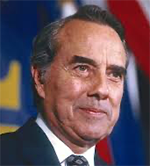
 an injured soldier to safety, the young lieutenant was lit up by enemy fire. He suffered a broken arm and shoulder and broken vertebrae in his spine and neck, and he lost a kidney. Others in his platoon dragged to him safety, but he lay for most of the day covered in blood in a foxhole until he could be transported to safety. He was paralyzed from the neck down. The Army sent him to a military hospital near Kansas. Some didn't expect him to live. He was suffering from blood cots, and an infection spiked his temperature to nearly 109 degrees Fahrenheit. In desperation after high does of penicillin didn't help, Army doctors gave him an experimental drug called streptomycin. It worked.
an injured soldier to safety, the young lieutenant was lit up by enemy fire. He suffered a broken arm and shoulder and broken vertebrae in his spine and neck, and he lost a kidney. Others in his platoon dragged to him safety, but he lay for most of the day covered in blood in a foxhole until he could be transported to safety. He was paralyzed from the neck down. The Army sent him to a military hospital near Kansas. Some didn't expect him to live. He was suffering from blood cots, and an infection spiked his temperature to nearly 109 degrees Fahrenheit. In desperation after high does of penicillin didn't help, Army doctors gave him an experimental drug called streptomycin. It worked. 